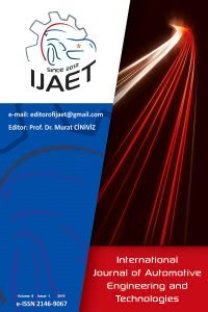Comparison of turbo compounding technoligies on gasoline and diesel engines
Comparison of turbo compounding technoligies on gasoline and diesel engines
___
- Weerasinghe, W. M. S. R., Stobart, R. K., & Hounsham, S. M. (2010). Thermal efficiency improvement in high output diesel engines a comparison of a Rankine cycle with turbo-compounding. Applied Thermal Engineering, 30(14–15), 2253–2256. https://doi.org/10.1016/j.applthermaleng.2010. 04.028
- Pasini, Gianluca. Evaluation of an Electric Turbo Compound System for SI Engines: A Numerical Approach. Applied Energy, 162 (2016) 527-540.
- Zhao, R., Li, W., Zhuge, W., Zhang, Y., & Yin, Y. (2017). Numerical study on steam injection in a turbocompound diesel engine for waste heat recovery. Applied Energy,185,506–518. https://doi.org/10.1016/j.apenergy.2016.10.135
- Salazar, M., Bussi, C., Grande, F. P., & Onder, C. H. (2016). Optimal Control Policy Tuning and Implementation for a Hybrid Electric Race Car. IFAC-PapersOnLine,49(11),147–152. https://doi.org/10.1016/j.ifacol.2016.08.023
- Dellachà, J., Damiani, L., Repetto, M., & Prato, A. P. (2014). Dynamic model for the energetic optimization of turbocompound hybrid powertrains. Energy Procedia, 45, 1047– 1056. https://doi.org/10.1016/j.egypro.2014.01.110
- Duhr, P., Christodoulou, G., Balerna, C., Salazar, M., Cerofolini, A., & Onder, C. H. (2021). Time-optimal gearshift and energy management strategies for a hybrid electric race car. Applied Energy, 282. https://doi.org/10.1016/j.apenergy.2020.11598 0
- Zhao, R., Zhuge, W., Zhang, Y., Yin, Y., Chen, Z., & Li, Z. (2014). Parametric study of power turbine for diesel engine waste heat recovery. Applied Thermal Engineering, 67(1– 2), 308–319. https://doi.org/10.1016/j.applthermaleng.2014. 03.032 https://doi.org/10.1016/j.apenergy.2020. 115980 https://doi.org/10.1016/j.applthermalen g.2010.04.028
- Chiara, F., & Canova, M. (2013). A review of energy consumption, management, and recovery in automotive systems, with considerations of future trends. In Proceedings of the Institution of Mechanical Engineers, Part D: Journal of Automobile Engineering (Vol. 227, Issue 6, pp. 914–936). SAGE Publications Ltd. https://doi.org/10.1177/0954407012471294
- Boretti, Albert. "F1 style MGU-H applied to the turbocharger of a gasoline hybrid electric passenger car" Nonlinear Engineering, vol. 6, no. 4, 2017, pp. 293-300. https://doi.org/10.1515/nleng-2016-0069.
- Yayın Aralığı: 4
- Başlangıç: 2012
- Yayıncı: Murat CİNİVİZ
Comparison of turbo compounding technoligies on gasoline and diesel engines
Esra ASİ ÖZTAŞ, Berkay GENC, Serdar GÜLEN
Vehicle-to-vehicle communication channel measurements on a vertical curve road
Kenan KUZULUGİL, Zeynep HASIRCI, İsmail ÇAVDAR
The effect of sintering time on the tribological properties of automotive brake pads
Investigation of fuel properties of biodiesel produced from hemp seed oil
